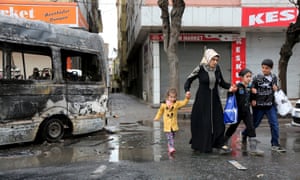
Ahmet, 21, walks past a house where a man is smearing wet concrete on a wall riddled with bullet holes. A young girl balances over a massive mine crater that scars the street, filled with debris and muddy water.
“Look what this war has done to the neighbourhood,” Ahmet says, greeting the girl with a nod. A member of the Civil Defence Units (YPS) – formerly known as the Patriotic Revolutionary Youth Movement (YDG-H) – Ahmet voices doubts about this new urban conflict in Turkey’s mainly Kurdish south-east. “I believe in autonomy, but these methods are wrong, they hurt us.”
Violence has escalated since a ceasefire between the government in Ankara and the outlawed Kurdistan Workers’ party (PKK) broke down last July, leaving a tentative three-year peace process in tatters and reviving a conflict that has cost more than 40,000 lives since it began in 1984.
“So many of my friends have died here,” says Ahmet, pointing vaguely at the narrow streets that now lie devastated. “Many of them were kids from Sur.” According to the Turkish general chief of staff, 279 militants were killed in the clashes in the central Sur district of Diyarbakir, as well as at least 60 soldiers and police officers. “Many believe they can take on the army, the Turkish state, because they carry a gun,” he says. “But the rich people don’t end up in the police or the army. It’s always the poor.”
In one of several attempts at self-rule in cities and towns across the region, activists announced local administrative autonomy for Sur in August last year. The government in Ankara responded with a violent crackdown, imposing blanket curfews on several towns, and Turkish security forces have deployed tanks and other heavy weaponry against armed Kurdish militants who have dug trenches and erected barricades.
Local residents are caught in the crossfire. According to a recent International Crisis Group report, at least 250 civilians are estimated to have been killed and more than 350,000 displaced. More curfews have been issued for the towns of Nusaybin, Sirnak and Yüksekova, where massive security operations are under way. The conflict reached the heart of the country when suicide bombers killed29 people in February, and another 37 in March in Ankara. The Kurdistan Freedom Falcons (Tak), a radical offshoot of the PKK, claimed responsibility for both bombings and vowed that attacks would continue in retaliation for security operations in the south-east.
In Sur, the military intervention officially came to an end on 10 March. The pro-government press declared victory, claiming that “Sur was cleansed of all terrorists”, but Aynur, a teacher in a primary school in central Diyarbakir, fears that the long-term costs of these operations will be high.
“The children feel totally disconnected from their country. They feel that the government sees them as enemies, not citizens,” she says. “Right now everyone is afraid, everyone is worried about staying alive. But once the dust will settle, in a year maybe or in two, fear will give way to anger.”
Those familiar with the region have long warned of a radicalisation among young Kurds in Turkey. Seraffetin Elçi, a well-known Kurdish politician originally from Cizre, who died in 2012, spoke of “tempest children” when describing this coming, angrier generation.
“We are the last generation with whom you can find a solution [to the Kurdish issue],” he told a parliamentary commission only months before his death. “After us comes one so angry that it will be difficult for them to make peace with the Turks, because … that generation sees Turks only as the gendarme, the police, the prosecutor, the judge, as those that beat them up and oppress them.”
Aynur agrees. In her class, she says, all the children sympathise with the Kurdish militants of the PKK’s youth wing, the YPS, who are fighting government forces in the cities. Names of fighters appear as admiring doodles on notebooks, and during breaks children imitate the “defence” of a “barricade” in the yard.
No comments:
Post a Comment